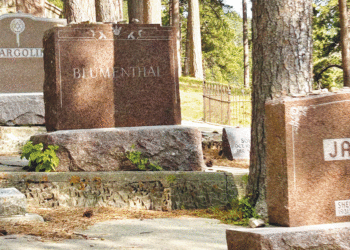People around the world have been riveted by news reports about the ongoing protests in Iran, and the brutal repression being meted out by the reactionary clerical regime. An unusual feature of the crisis in Iran is the role played by social networking Web sites — especially Twitter — which brings real-time accounts of unfolding events to personal computers.
As election protests were gathering momentum last week in Iran, two representatives of the Israel Ministry of Foreign Affairs (MFA) in Jersualem were visiting Minnesota. The pair were booked to meet with a group of Jewish invitees to discuss the timeliest of topics: “The Threat to the World Posed by a Nuclear Iran.”
Prior to their symposium last Thursday evening, Jonathan Miller, senior deputy director general of the MFA, and Ofer Moreno, deputy director of the MFA’s department for non-proliferation, talked to the American Jewish World about the events rocking Iran, especially their meaning for Israelis who have been anxious about the emergence of an Iranian regime with nuclear weapons.
Miller, who made aliya from South Africa as a young teenager, stressed that Israel was taking no position in Iran’s internal affairs. However, a few days later, at a meeting for funders of the Jewish Agency for Israel, Israeli President Shimon Peres said, “Let the young people raise their voice of freedom for a positive policy. Let the Iranian women, who are a very courageous group of people, voice their thirst for equality, for freedom.”
Peres also said, according to a JTA report: “You never know what will disappear in Iran first —their enriched uranium or the wretched government. We hope it’s the government.”
So much for staying apart from the fray in Iran.
News reports of last Friday’s address by Iran’s “supreme leader,” Ali Khamenei, showed a huge throng in a Tehran mosque — with President Ahmadinejad up front with the dignitaries — chanting, “Death to America! Death to Britain! Death to Israel!” Police and civil militias, including the dreaded Basij, have backed up the vile rhetoric and threats from the clerics by gassing, beating and shooting demonstrators in Tehran and other cities. The murder, apparently by a government-allied sniper, of a young woman named Neda Salehi Agha Soltan, seen by millions in a mobile phone video uploaded to the Web, has put a human face on the regime’s brutal repression.
The visiting Israeli diplomats, whose focus was on the strategic threat posed by Iran’s quest for nuclear weapons — and its global diplomatic initiatives in South America, Africa and East Asia — stressed that there is little substantive difference between the policies of Ahmadinejad and his electoral rivals. For starters, only four parties approved by the council of clerics were allowed to run in the presidential election.
The visiting Israelis also pointed out that before Ahmadinejad started issuing calls to wipe Israel off the map, former Iranian president Ali Akbar Hashemi Rafsanjani was issuing similar threats; Rafsanjani, whose daughter was briefly detained and then released, is one of the ayatollahs backing reformist candidate Mir-Hossein Mousavi. Put in terms of the American political landscape, the ideological differences between Ahmadinejad and Mousavi might be similar to the divide between John McCain and Sarah Palin.
During the course of an hour-long talk, Moreno mentioned that, unlike the lunatic regime in North Korea (remember that guy?), Iran’s rulers are susceptible to sanctions from the West. Miller said that Iran does want to be a player in the international community; in this vein, he emphasized that Israel supports President Obama’s effort to engage diplomatically with Iran.
“There is no clash on the Iran issue,” he said, regarding reports of a U.S.-Israel split over relations with Iran.
Asked to name the Israeli experts on Iran, the MFA guys agreed that Prof. David Menashri, director of the Center for Iran Studies at Tel Aviv University, is one of the eminent authorities. In an interview with the Mideast Peace Pulse Blog, a Web site affiliated with the Israel Policy Forum, Menashri explicated some of the contending forces now playing out in Iran. He concluded the interview with the following thoughts on the epochal events we have been watching: “Deep in Iranian society, the experiences of the last few days will be very crucial and important for the long run even if this movement is ultimately suppressed. Something happened in the Islamic Republic of Iran and you never can know how it will end. As a famous Israeli poem reads: All of a sudden, a nation wakes up in the morning and starts moving in a new direction. There is something in all popular movements that is unpredictable; our knowledge is simply insufficient to predict the outcome, or even to determine what would be the last straw that breaks the camel’s back. Even if not fully successful, there is no question that the memory of today’s events will continue to have influence and will linger in the back of the minds of Iranians for years to come.”
— Mordecai Specktor / editor@ajwnews.com
(American Jewish World, 6.26.09)



















